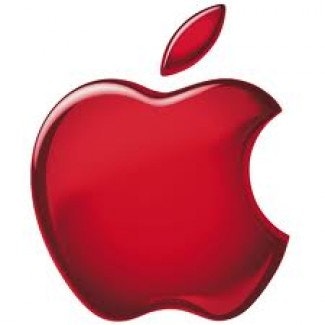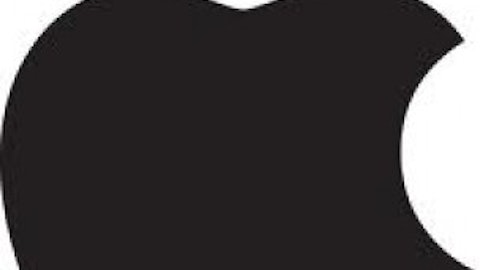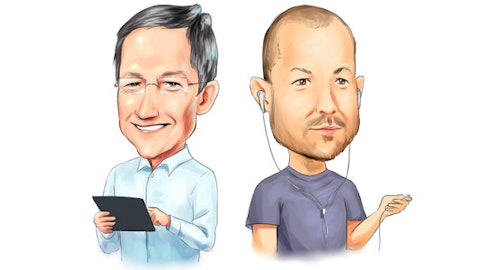
Analysts believe Apple Inc. (NASDAQ:AAPL) should manufacture a low-cost smartphone targeted for price sensitive consumers to propel the company’s profits and market share in developing markets.
Apple Earnings
Apple Inc. (NASDAQ:AAPL) impressed with its strong iPhone sales of 31.2 million units that beat Wall Street expectations, but the Cupertino-based company showed declining profits and flat revenue growth in its latest third quarter earnings results. Net profit came in at $6.9 billion, or $7.47 per share, compared to a net profit of $8.8 billion, or $9.32 per share, a year ago. Revenue rose only 1% to $35.3 billion. Sharp declines in year-over-year (YoY) profit and revenue growth reflects the lack of new products this year and stiff competition from Samsung, Nokia and Chinese brands.

Source: Bloomberg
Gross margin trended lower to 36.9%, down from 42.8% in the year-ago quarter. Apple Inc. (NASDAQ:AAPL)’s lack of gross margin expansion resulted from higher shipments of its older, lower-priced iPhone 4 models to first-time buyers, which underwent price cutting to meet consumer demand in developing markets such as China and India. Apple Inc. (NASDAQ:AAPL) may need to enter that low-end market to revive growth, although a lower-priced iPhone may cannibalize sales of its high-margin phones and further dampen gross margins.

Source: Bloomberg
A report from China Labor Watch released earlier this week reveals that Apple Inc. (NASDAQ:AAPL) does have a cheaper iPhone in production.
“At this moment, in Shanghai, China, workers in Apple Inc. (NASDAQ:AAPL)’s supplier factory Pegatron are monotonously working long overtime hours to turn out a scaled-back, less expensive version of the iPhone,” the report unveils.
Analysts expect a budget iPhone to release sometime this fall or early 2014 when the company rolls out new products.
Samsung’s Mobile Division Dips
SAMSUNG ELECT LTD(F) (NASDAQOTH:SSNLF) posted second quarter earnings that missed consensus estimates. For the three months ended June 30, net income came in at a record ₩7.7 trillion (US $6.9 billion) from ₩5.19 trillion a year ago. Revenue soared 21% YoY to ₩57.46 trillion (US $51 billion). Although the company was able to meet its quarterly guidance issued earlier this month, a sell-off ensued after the announcement as analysts expected a net income of ₩7.96 trillion on revenue of ₩57.81 trillion.
Operating profit climbed to ₩9.53 trillion (US $8.5 billion), up 47.5% YoY. Operating profit from SAMSUNG ELECT LTD(F) (NASDAQOTH:SSNLF)’s mobile division, the company’s biggest earnings generator, rose 52% to ₩6.28 trillion (US $5.6 billion) from a year ago, but dropped 3.5% from the previous quarter.
SAMSUNG ELECT LTD(F) (NASDAQOTH:SSNLF)’s mobile division, which accounts for two-thirds of its total revenue, outlines the company’s smartphones, tablets, PCs and network equipment. SAMSUNG ELECT LTD(F) (NASDAQOTH:SSNLF) does not provide a breakdown of sales for each segment, but its earnings report reveals that its mobile business represented ₩34.58 trillion (US $30.7 billion) of its total sales for the quarter. These results compare to ₩31.77 trillion last quarter and ₩22.43 trillion in the year-ago quarter.
According to Han-Joong Kim, Samsung’s VP of Mobile Planning, SAMSUNG ELECT LTD(F) (NASDAQOTH:SSNLF) expects smartphone sales shipments to outpace the broader smartphone market growth in the third quarter, led by a wider range of mid to low end models. “We think that smartphones as a percentage of our total mobile handset portfolio is likely to exceed 70%,” he said in the earnings call.
“Entering into a typically strong season for the IT industry, we expect earnings to continue to increase,” Robert Yi, Samsung’s senior vice president and head of investor relations, said in a statement. “However, we cannot overlook delayed economic recovery in Europe and risks from increased competition for smartphones and other set products.”
Smartphone Market Data
In the second quarter, worldwide smartphone shipments showed 52.3% year-over-year growth, according to data compiled by IDC. Vendors shipped 237.9 million smartphones, compared to 216.3 million in the first quarter and 156.2 million a year ago. Apple and Samsung lost market share to LG, Lenovo, ZTE and other handset makers that offered lower-priced handset models in high-growth countries such as China and India.

Source: Bloomberg
Samsung remained the world’s largest smartphone maker based on shipments of 72.4 million units (+43.9% YoY), accounting for 30.4% market share, down from 32.2% a year earlier. Strong Galaxy S4 shipments and regional growth in North America and China improved the company’s smartphone demand and sales for the quarter.
Apple shipped 31.2 million units and captured 13.2% market share, the lowest in the three years, down from 16.6% a year earlier. Samsung’s domestic rival LG Electronics gained 5.1% market share on shipments of 12.1 million units, compared to 5.8 million units and 3.7% share a year ago. China-based Lenovo and ZTE gained 4.7% and 4.2% market share, respectively.
Bottom line
Samsung may experience sluggish growth for its high-end smartphone shipments in the third quarter as its mobile business expands into the mid to low-end smartphone market. Margins are expected to stay flat or decline slightly as it aims to bolster its market share in the emerging markets with cheaper smartphones. Samsung, unlike Apple Inc. (NASDAQ:AAPL), has been more responsive in the mid to low-end smartphone segment, but IDC expects Apple’s brand presence and sales growth to accelerate if it launches a lower-cost iPhone into the market.
The article Apple and Samsung’s Growth Slows Down originally appeared on Fool.com and is written by Christopher DeSousa.
Christopher DeSousa has no position in any stocks mentioned. The Motley Fool recommends Apple. The Motley Fool owns shares of Apple. Christopher is a member of The Motley Fool Blog Network — entries represent the personal opinion of the blogger and are not formally edited.
Copyright © 1995 – 2013 The Motley Fool, LLC. All rights reserved. The Motley Fool has a disclosure policy.




